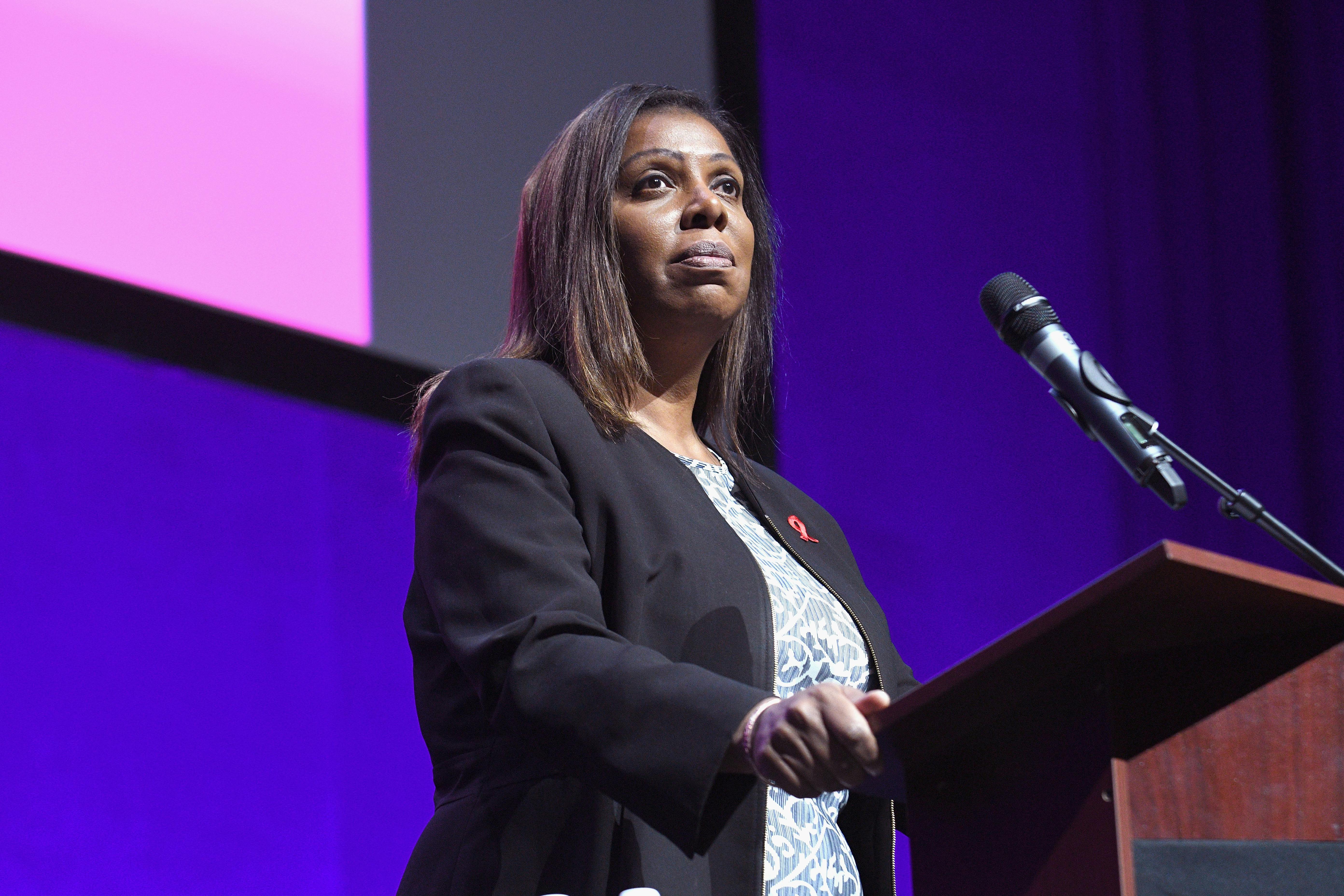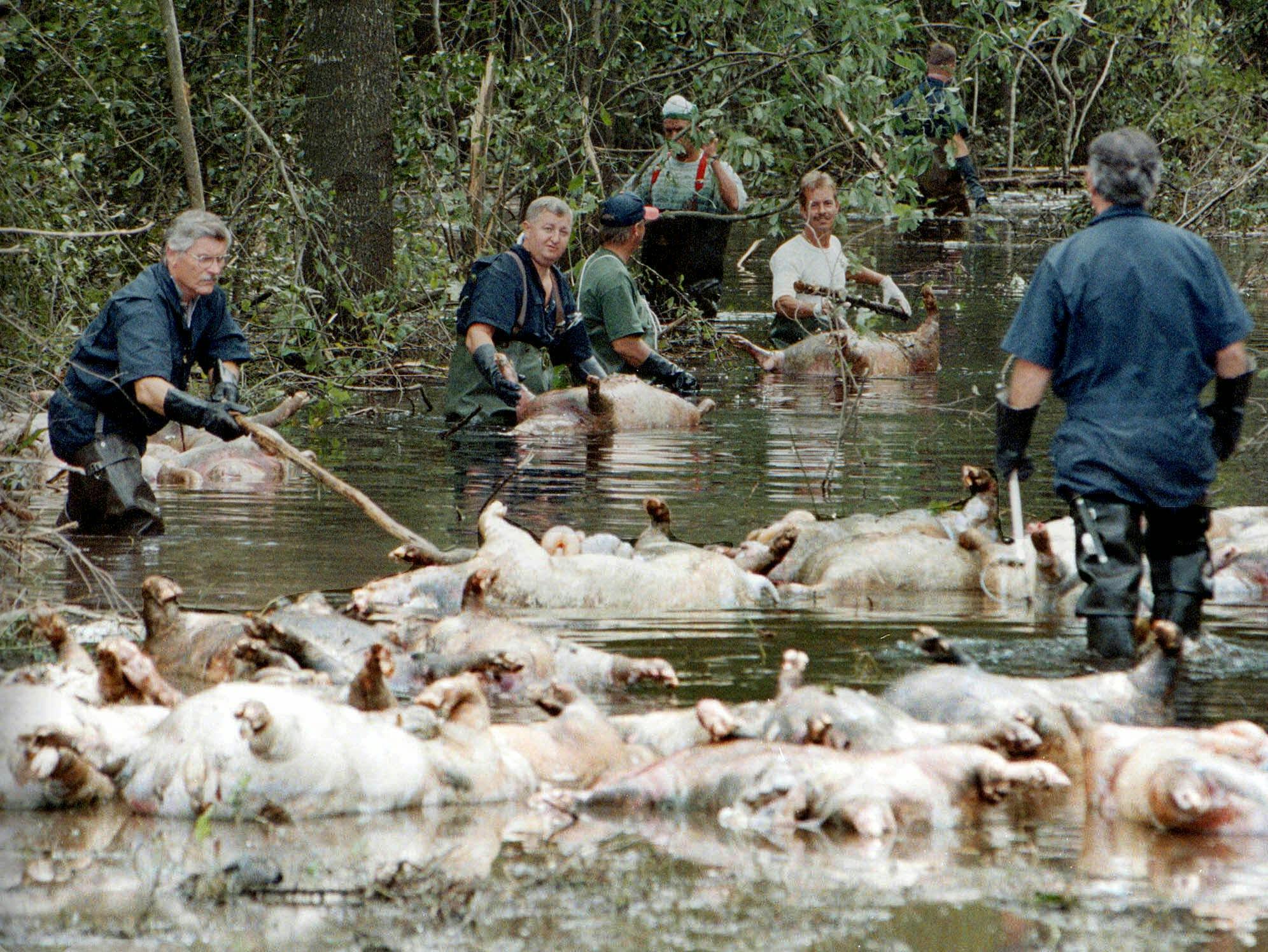
By winning the Democratic primary to be New York’s next attorney general, Tish James is now virtually guaranteed to become the state’s top legal officer this November. That position will almost immediately make her into a national figure—and perhaps the most influential state official in the country who isn’t a governor.
James, who currently serves as the public advocate of New York City, trounced three rivals to capture the Democratic nomination. The race saw strong challenges from her left flank by Zephyr Teachout, a Fordham University law professor known for her anti-corruption work, and Sean Patrick Mahoney, a sitting congressman. New York’s status as a Democratic stronghold means that the party’s primary is the de facto election to office, and her victory in November is all but certain.
It’s no slight against other states to note that James will wield slightly more power than the typical attorney general. Other big blue states are home to strong attorneys general, too: California’s Xavier Becerra, for example, is a leading figure in litigation against the Trump administration. (The state budget even set aside more money for him to fight the White House last year.) But it’s hard to compete with New York. After all, it’s easy to become a national figure when your jurisdiction includes the nation’s preeminent urban metropolis and the nerve centers of American media.
That’s become more true in the past decade, as attorneys general have become key players in national politics. Republican-led offices frequently banded together to challenge the Obama administration, from the Affordable Care Act to his executive order enacting the DACA program for children of undocumented immigrants. After Trump took office, it was the blue states’ turn. Democratic attorneys general have waged their own legal wars on the Trump administration’s travel ban, regulatory rollbacks, and family separations. Those fights have made the position into a politically lucrative one in an era where Democrats are powerless in Washington. Keith Ellison, who was a rising Democratic star in Congress, opted to run for the Minnesota attorney general’s office this year instead.
New York’s singular status gives James even more opportunities to make a national impact. The state is home to the bulk of America’s financial infrastructure, thereby giving its attorney general a unique set of responsibilities. Eliot Spitzer spent the bulk of his tenure using New York’s broad anti-fraud laws to investigate major Manhattan banks and corporations, a crusade that transformed the office into “the sheriff of Wall Street” and catapulted him to the state governorship. (He resigned two years later after a prostitution scandal.) Andrew Cuomo, the state’s current governor, succeeded Spitzer and followed a similar path, minus the prostitution scandal.
James will be expected to carry on the office’s modern role as a financial watchdog and an anti-corruption enforcer, though she disclaimed the “sheriff of Wall Street” moniker on the campaign trail. But the job’s most pressing responsibility today is keeping an eye on an even bigger fish. By sheer happenstance, President Donald Trump and his business empire fall under the jurisdiction of the New York attorney general’s office. This wouldn’t matter much under normal circumstances, but Trump is not a normal president.
In fact, two of James’s predecessors have already tangled with the president. In 2013, Eric Schneiderman began investigating Trump University, a now-defunct real-estate seminar program, for defrauding thousands of its customers. Lawsuits in other states depicted the seminars as a scheme preying on financially insecure people and offering them mundane real-estate advice for thousands of dollars. Trump settled the lawsuits, including Schneiderman’s, for $25 million after the election. Earlier this year, current New York Attorney General Barbara Underwood sued to shut down the Donald J. Trump Foundation for habitually violating state charity laws. James pledged to serve as an anti-corruption check on the president during her candidacy.
Policing Trump’s business empire may only be the beginning. The New York attorney general’s office has reportedly worked with special counsel Robert Mueller on his sprawling investigation into Russian electoral meddling, although the full extent of the offices’ cooperation is unknown. There’s widespread speculation that the New York attorney general could theoretically function as a dead man’s switch for the Russia investigation, continuing the case in some form even if the federal inquiry is shut down. Trump could theoretically fire Mueller, purge the rest of the Justice Department, and pardon his political allies at a moment’s notice. But he has no power over state-level investigations, and presidential pardons only apply to federal crimes.
As a result, James could find herself playing a pivotal role in American history should the worst come to pass. She made clear on the campaign trail that she’s eager for the fight. “The president of the United States has to worry about three things: Mueller, [Michael] Cohen, and Tish James,” she said in a recent interview. “We’re all closing in on him.”

Florence, the hurricane charging toward the Carolina coast, has been called a “monster,” a “Mike Tyson punch,” and the “storm of a lifetime.” On Wednesday, it was generating waves up to 83-feet high. Though Florence was downgraded to Category 2 on Wednesday night, the National Hurricane Center says it’s still an “extremely dangerous major hurricane” that’s expected to bring “life-threatening storm surge”—as high as 13 feet in some places—and as much as 40 inches of rain, which “would produce catastrophic flash flooding and prolonged significant river flooding.”
Residents are bracing for the impact, as more than 750,000 homes are at risk from storm surge damage, according to one estimate. But coastal properties aren’t the only ones that could be pummeled. Heavy, prolonged rainfall—perhaps up to 40 inches—is expected over a large portion of South Carolina, North Carolina, and Virginia. Much of the ground there is already saturated from past wet weather, increasing the likelihood of catastrophic flooding in inland homes and businesses.
But experts are also warning that Florence will bring something less visible: an unprecedented threat of sickness, particularly to low-income communities and other vulnerable populations. The storm is predicted to move inland after making landfall, and its likely path runs through the heart of North Carolina’s hog farming and coal country, where dozens of unlined lagoons of animal feces and chemical waste sit adjacent to the drinking water sources of thousands of rural poor.
“The path it’s currently on is about as bad as it could be,” said Geoff Gisler, who heads up the Southern Environmental Law Center’s clean water program. According to the National Hurricane Center, Florence is expected to travel directly through North Carolina’s coastal lowlands, where much of the state’s 9 million hogs are raised. (North Carolina has 10 million people.) These hog operations produce almost 10 billion gallons of feces a year—“enough to fill more than 15,000 Olympic-size swimming pools,” according to the Environmental Working Group. That feces is then stored in large open-air lagoons, which Gisler said risk overflow with Florence’s massive expected rainfall totals.
Left: concentration of industrial hog farms (aka poop lagoons) in North Carolina
Right: most recent expected track of Hurricane Florence pic.twitter.com/o7bP0xeZ5H
Overflows bring a number of health risks. “You don’t want hog waste flowing freely for the same reasons you wouldn’t want sewage flowing freely into the river and the house,” Gisler said. Feces is a breeding ground for bacterial pathogens like salmonella and giardia, and exposure via drinking water could cause experience a number of gastrointestinal problems. Exposure via open wounds or other mucous membranes could cause E. coli.
North Carolina has seen this before. During Hurricane Floyd in 1999, the manure lagoons from dozens of hog farms spilled “over thousands of acres of private and public lands and into the watersheds of four rivers that feed the second-largest estuary system in the nation,” according to the environmental news site Coastal Review. The storm’s extreme rainfall also killed more than 20,000 hogs, whose drowned bodies’ were scattered across the coastal landscape. The state legislature passed a moratorium on new manure lagoons after Floyd, but critics say little has been done to reduce the number of them across the state.
This also happened, to a lesser degree, in 2016, when Hurricane Matthew submerged 14 hog manure lagoons. That time, farmers managed to pump out some waste before the storm hit, and used it as fertilizer on nearby fields. Pork farmers have been doing the same thing this week, in preparation for Florence. But Gisler says this solution is inadequate because once heavy rainfall starts, fecal matter spread on farmland will still run off into waterways and seep into groundwater.
There’s also concern about overflows from North Carolina’s huge pits of coal ash—the waste left over from coal burning. This byproduct—which often includes metals like lead, mercury, arsenic, chromium, and selenium—is often stored in unlined pits next to lakes and rivers, because coal plants need to be near water sources to generate steam. North Carolina has at least two dozen of these pits, many of which are located alongside major river systems like the Neuse, Cape Fear, and Lumber—all in Florence’s projected path.
“Eastern North Carolina is the worst place a hurricane could come in terms of coal ash risk to communities,” said Frank Holleman, an SELC senior attorney who works on the issue. “These sites are dangerous when the sun is shining,” he said, referring to past spills that sullied local drinking water sources with toxic gook. “But when you have high winds, floodwaters, storm surges, and then flooding from heavy rains, each these sites is a cause of serious concern for communities and rivers throughout coastal North Carolina.”
In preparation for Florence, the Environmental Protection Agency is monitoring nine of the nation’s most toxic sites—known as Superfund sites—where various chemicals and pesticides risk spreading due to excessive rainfall. But that’s only a fraction of the Superfund sites in Florence’s path, according to the Kansas City Star, which counted more than 60.
Massive hurricanes like Florence threaten public health no matter where they hit. Warm, still floodwaters always serve as breeding grounds for infectious diseases and mosquitoes. Flooding always causes sewage and wastewater treatment systems to fail, overflowing into homes and businesses. High winds and heavy rains always cause infrastructure damage and power outages, which make it harder for people to access medical care. And poor, minority, and elderly populations are always disproportionately affected.
But there’s also always a twist, said Irwin Redlener, the director of Columbia University’s National Center for Disaster Preparedness. “Every single storm has its own identity, its own fingerprint,” he said. “No two are ever alike.” For Hurricane Harvey in Texas last year, it was the storm’s close proximity to the nation’s petrochemical infrastructure—a proximity which led to gas spills, air pollution, and chemical explosions. For Hurricane Maria in Puerto Rico, it was the island’s already-crumbling electricity infrastructure and the Trump administration’s weak preparation and response.
For Hurricane Florence, Redlender fears it will be defined by its impact on the rural poor. “There’s a lot of poverty in those communities,” he said. The health impacts from the state’s hog farming industry, for instance, disproportionately affect poor and African American communities. And when public health impacts hit poor communities, the effects are generally worse. “You’re more vulnerable to everything,” he said. “Your health problems are more prevalent and severe. You won’t have the access or ability to purchase medications. You’re more likely to be uninsured.”

No comments :
Post a Comment